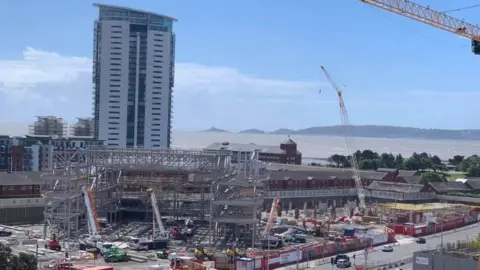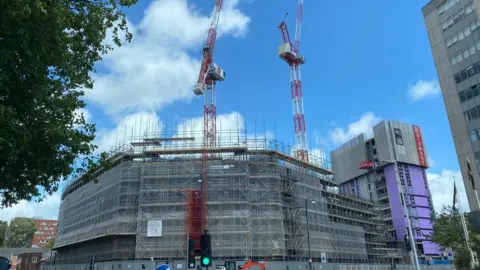Swansea council still 'confident' over city centre revamp despite pandemic
 Swansea Council
Swansea CouncilSwansea council remains "confident and optimistic" over its £135m redevelopment despite coronavirus.
Locations around Wales have been left deserted by the pandemic as people follow lockdown guidelines.
However the local authority is pressing ahead with its Swansea Central project, which aims to attract thousands of people to the heart of the city.
The project aims to "reinvent" the city by creating a hub of 11,000 people working and living in the area.
A 3,500-seat arena is also to be built alongside a hotel, shops, bridge and apartments.
However, densely-populated centres could prove unattractive to some, with scientists warning we will need to practise social distancing for at least the next 12-18 months.

Swansea council is close to completing the Kingsway redevelopment - one of the main roads in the city - while work has continued during lockdown on student accommodation and the arena, which is due to be completed in the summer of 2021.
"Hopefully it will be completed in time for when we're coming out of the lockdown restrictions and people can resume some sort of normality with their lives," said council leader Rob Stewart.
"Cities are still going to be the beating heart of the economy across the UK.
"I don't agree that restrictions have been lifted so quickly [in England] but as soon as restrictions are, people flocked back to beaches and cities.
"I remain optimistic. We're building for the future success of the economy of Swansea and the region, so there's no reason to depart from that."
Cities are already adapting to the coronavirus crisis.
In Paris, 650km of cycleways are being built, Milan has announced plans for a car-free future while in the US, 75 miles of streets in New York City will be allocated to pedestrians and cyclists.

The crisis could even present Swansea with an "opportunity" to create a more environmentally-friendly future, according to one expert.
Professor Mark Barry, of Cardiff University, said moving businesses to city centres reduces car use, promotes investment in public transport and drives customers to high streets.
"Irrespective of the Covid crisis, we need more of our activities, jobs, offices and retail to be located around other transport hubs," he said.
"We need to reduce the tendency over the last 30 years of putting things around motorway junctions and out of town sites. It's very environmentally damaging."

Dr Chris Muellerleile, an urban and economic geographer from Swansea University, said the attraction to city living and the close proximity to amenities will continue.
"Lots of people believe what draws people to cities will last, and is enduring," he said.
"While there are short-term and maybe even medium-term risks to the proximity of urban living, over the medium to long term, cities will survive and thrive."
